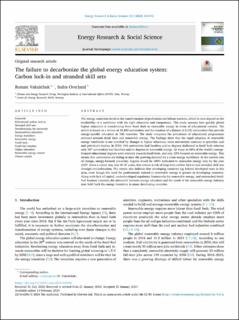| dc.contributor.author | Vakulchuk, Roman | |
| dc.contributor.author | Øverland, Indra Nobl | |
| dc.date.accessioned | 2024-04-25T13:56:02Z | |
| dc.date.available | 2024-04-25T13:56:02Z | |
| dc.date.created | 2024-02-15T12:47:48Z | |
| dc.date.issued | 2024 | |
| dc.identifier.citation | Energy Research & Social Science. 2024, 110 103446-103446. | en_US |
| dc.identifier.issn | 2214-6296 | |
| dc.identifier.uri | https://hdl.handle.net/11250/3128127 | |
| dc.description.abstract | The energy transition involves the transformation of professions and labour markets, which in turn depend on the availability of a workforce with the right education and competence. This study assesses how quickly global higher education is transitioning from fossil fuels to renewable energy in terms of educational content. The article is based on a review of 18,400 universities and the creation of a dataset of 6,142 universities that provide energy-specific education in 196 countries. The study compares the prevalence of educational programmes oriented towards fossil fuels and renewable energy. The findings show that the rapid adoption of renewable energy worldwide is not matched by changes in higher education, since universities continue to prioritise coal and petroleum studies. In 2019, 546 universities had faculties and/or degrees dedicated to fossil fuels whereas only 247 universities had faculties and/or degrees in renewable energy. As many as 68% of the world’s energy-focused educational degrees were oriented towards fossil fuels, and only 32% focused on renewable energy. This means that universities are failing to meet the growing demand for a clean energy workforce. At the current rate of change, energy-focused university degrees would be 100% dedicated to renewable energy only by the year 2107. Since a career may last 30-40 years, this creates a risk of long-term carbon lock-in and stranded skill sets through (mis)education. The results also indicate that developing countries lag behind developed ones in this area, even though the need for professionals trained in renewable energy is greater in developing countries. Along with lack of capital, underdeveloped regulatory frameworks for renewable energy, and entrenched fossil-fuel business interests, the mismatch between energy education and the needs of the renewable energy industry may hold back the energy transition in many developing countries. | |
| dc.description.abstract | The failure to decarbonize the global energy education system: Carbon lock-in and stranded skill sets | |
| dc.language.iso | eng | en_US |
| dc.rights | Navngivelse 4.0 Internasjonal | * |
| dc.rights.uri | http://creativecommons.org/licenses/by/4.0/deed.no | * |
| dc.title | The failure to decarbonize the global energy education system: Carbon lock-in and stranded skill sets | en_US |
| dc.title.alternative | The failure to decarbonize the global energy education system: Carbon lock-in and stranded skill sets | en_US |
| dc.type | Peer reviewed | en_US |
| dc.type | Journal article | en_US |
| dc.description.version | publishedVersion | |
| dc.source.pagenumber | 103446-103446 | en_US |
| dc.source.volume | 110 | en_US |
| dc.source.journal | Energy Research & Social Science | en_US |
| dc.identifier.doi | 10.1016/j.erss.2024.103446 | |
| dc.identifier.cristin | 2246396 | |
| dc.relation.project | Norges forskningsråd: 324628 | |
| cristin.ispublished | true | |
| cristin.fulltext | original | |
| cristin.qualitycode | 1 | |

